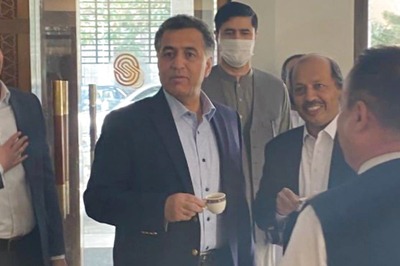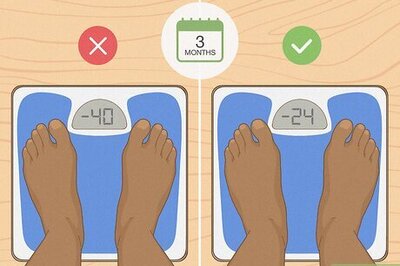
views
“Pehle private hospital se dawai leni padhti thi, aur bachon ko aaram bhi nahi aata tha" (Earlier we had to buy medicines from private hospitals and the children didn’t even feel better), says Sona, 29, who travels from Delhi’s Bhrampuri to Nangal Raya mohalla clinic every time she needs to see a doctor.
Open drains, heaps of garbage and narrow, claustrophobic streets of Delhi’s Nangal Raya village — a place which even the GPS fails to navigate — stands in stark contrast to the three-bedroom expanse of the mohalla clinic situated within.
Close to 80 patients visit this clinic daily, except on a Sunday. What they get is free doctor consultations, tests and medicines.
Every mohalla clinic has a doctor, a technician for uploading patients’ Aadhaar details and a lab assistant for collecting blood samples and disbursing medicines. The clinic works from 8 AM to 2 PM.
Sona isn’t the only one who prefers such clinics over private hospitals. Anjum, 38, is happy, because now she doesn’t have to visit the Batla house dispensary for her medical check-up. She prefers to go to Okhla’s mohalla clinic instead. Here, she doesn’t have to stand in long queues and she gets all the medicines for free.
‘‘It is very useful for us. Since it is close, it is not difficult for patients to visit here. The dispensaries were very crowded and sometimes medicines were out of stock’, Anjum added.
Another patient, Nimmi, who has been a regular visitor at the clinic for eight months, agrees with Anjum. “Unlike Batla house dispensary, we don’t have to jostle here for our turn. Our doctor is also very helpful and treats us well," she said.
Establishing mohalla clinics, or primary healthcare centres, is Delhi government’s flagship scheme. After coming to power in 2015, the Aam Admi Party (AAP) had promised to construct 1000 mohalla clinics across the city in an attempt to boost the city’s healthcare infrastructure. However, only around 160 clinics are currently functioning in the city.
While most patients seem to be satisfied with the way these clinics function, the doctors and staff have their own set of problems.
Doctors’ Security
Pandav Nagar’s mohalla clinic is visited by more than 150 patients daily. The empanelled doctor, Preeti Saxena, however, is worried about her security as she claims that patients often tend to misbehave here.
“There is a lot of insolence on patients’ part. One of them locked me inside when I refused to treat him as he came after the closing time. I had to call an AAP volunteer to solve this. My helper was slapped by one of the patients a few days ago. The other day, another patient misbehaved with me and I had to call the police," Dr Preeti said.
Dr Preeti is not an exception. Dr VS Chauhan has a similar complaint. “We don’t have any security. A lot of people misbehave with us. They try to jump queues and resort to “goondagardi" at times. We have to call the police to control them," he said.
Ashram’s mohalla clinic in south Delhi is visited by more than 140 patients daily. Unlike other clinics, this clinic has only one room. At peak hours, it becomes almost impossible to accommodate them all.
Despite issues of queue management and lack of space, people continue to visit the clinic for free medicines and check-up.
But for the doctors employed at these centers, this subsidized treatment is the reason behind the misconduct of patients.
“Security is of utmost importance. Though they have other government dispensaries near their homes, they want to come here as they are getting good services. This obviously leads to overcrowding and we require security to deal with them – especially because we have all women staff here and men often misbehave with us," says Dr Preeti.
Delay in salaries and lack of staff
The salaries of the staff employed at mohalla clinics are highly variable, as it depends on the number of patients visiting the clinic. While doctors get Rs 30 per patient, technicians and lab assistants get Rs 8 and Rs 2 per patient, respectively.
Though the number of patients and workload constantly varies, the staff complains about the low wages and regular delays in payment.
Tarun Chand, 28, has been working at Ashram’s mohalla for two years. He claims that initially, it was decided that he would get Rs 10 per patient, but ever since the government made patients’ Aadhaar registration mandatory, his salary was reduced to Rs 2.
“I manage to get just Rs 6500 per month, which is quite low for me. Even peons today wouldn’t work for this amount," says Tarun.
Another assistant at Nangal Raya mohalla clinic complained about the same issue. “Last month we got 1500 patients and my salary was just Rs 3000. How can one manage their homes with such a low salary in today’s time?"
In fact, many doctors complained that their own salaries are often delayed by a month.
Besides the low salary, the staff is also not paid on time. Sometimes, their salaries are delayed by almost four months. According to the doctor at Ganesh Nagar clinic, the technician at the centre left her job due to such elaborate delays in receiving salaries.
The doctor now has to manage with the lab assistant to complete all tasks like collecting blood samples and maintaining patients’ record. This also results in delays in compiling patient reports.
Dr Rajesh Jeedigunta, who is currently managing Nangal Raya’s clinic on a temporary basis, echoes the prevalence of these problems along with the lack of pharmacists at the clinics.
Shortage of medicines
While most of the doctors deny any shortage of medicines, doctors at Pandav Nagar and Ashram mohalla clinics complain about a long delay in receiving the required medicines.
“Because of the shortage, we are forced to cut short the amount of medicines required, we cannot send anyone without medicines," said Dr Saxena.
Dr Chauhan added, “We already have a shortage of staff, and then we have to get medicines from the dispensaries. If we get pharmacists directly, it will be better."
The doctor at Manglapuri clinic, who chooses to not reveal her identity, also agrees with all these problems but fears to complain openly. “We are hired on a contractual basis; we don’t want to be unnecessarily dragged on these issues in the media, as this later becomes political."
While Delhi government claims that after SC’s recent verdict on the power tussle in the national capital, will help in achieving the established target, it is imperative for authorities to focus on the ground reality of the already functioning clinics. Delhi’s Health Minister, Satyendra Jain was unavailable for comments.




















Comments
0 comment